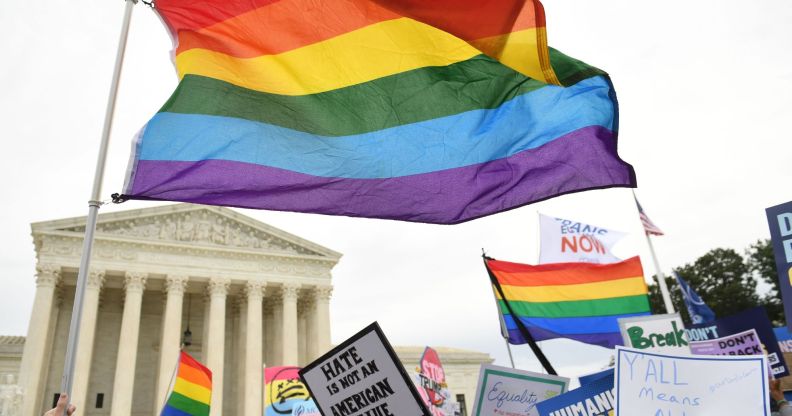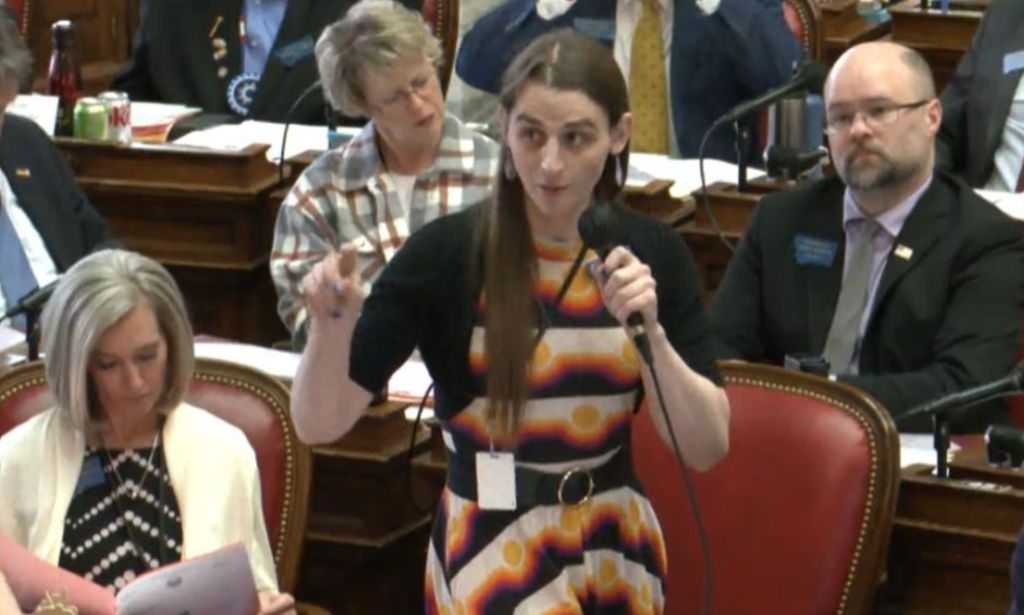The shocking state of US LGBTQ+ rights in 2023

Anti-LGBTQ+ bills have wreaked havoc across US states. (Getty Images)
State legislators in the US have spawned so many anti-LGBTQ+ bills in the past 12 months that it’s easy to lose track.
The current, most reliable number reported by the American Civil Liberties Union (ACLU) is 508 bills. However, the independently researched trans legislation tracker puts the number at 589, across 49 states.
By comparison, a conservative estimate of the number of bills filed against the LGBTQ+ community in 2022 is 174, meaning the count has increased by more than 230 per cent this year.
Bloomberg reported that US state legislatures passed last year’s number as early as March.
A hefty percentage of these anti-LGBTQ+ bills failed to make it on to the statute books, with the ACLU reporting that 84 bills passed into law compared to 227 that were defeated or which are still being processed.

Activists across the US have argued that passing the bills is not the primary goal. Instead, they believe it is to instil fear in the LGBTQ+ community, while distracting from the ever-growing list of deeply ingrained issues the country is facing.
In an interview with PinkNews in May, trans Montana representative Zooey Zephyr described the legislation as a way of masking “inadequate solutions to major crises” facing the US. She was censured for speaking out against legislative attacks on LGBTQ+ folks.
“There is such a deep, deep housing crisis in our state that needs serious solutions across the gamut,” she told PinkNews. “What we saw throughout the government session is that Republicans were not interested in the breadth of legislation necessary to address the crisis.
“When they bring those anti-LGBTQ+ bills, they’re doing it because when you turn to the issues impacting Montanans in their day-to-day life, [they] don’t have answers.”
The tidal wave of anti-LGBTQ+ bills being introduced isn’t happening in a vacuum
The sad truth is that the tactic of distraction works. Dangerous and constitutionally compromised bills are hard to miss, especially when, regardless of the intentions behind their introduction, they actually pass into law.
Of the 84 anti-LGBTQ+ bills enacted this year, 26 restrict life-saving gender-affirming care in some capacity, 34 restrict freedom of expression in schools, and four prevent trans people using accurate gender markers or pronouns on official documents.
Florida senate’s SB254, better known as the ‘Treatments for Sex Reassignment Bill’, allows the state to effectively kidnap a person’s child if it believes they have been offered gender-affirming care or “sex-reassignment procedures”. Gender-affirming surgery for minors has never been legal in the US.
Gender-affirming care, however, can refer to physically reversible puberty blockers, which are often prescribed to teenagers before they even consider starting hormone replacement therapy.

SB254 is an horrific bill, but it was not created in a vacuum, and it didn’t pass through the state government in one simple move. Right-wing politicians elsewhere have created carbon copies of extreme anti-LGBTQ+ laws passed in Republican-controlled states, all of which threaten the existence of LGBTQ+ rights.
States including North Carolina, Louisiana, Missouri and Texas have passed laws restricting healthcare for LGBTQ+ people, particularly trans people.
The barrage of legislation has had a serious impact on how both activist groups and human rights organisations handle homophobia and transphobia in the US.
The ACLU, in particular, has shifted into overdrive, pushing back against any and every anti-LGBTQ+ bill it can, through grassroots court actions. It is currently fighting 14 bills in court.
Meanwhile, pro-LGBTQ+ politicians have been pleading with their rivals to help block as many of these types of bill as possible. Some state capitol buildings even descended into chaos as protests against the censorship of LGBTQ+ people continued.
‘We need to make sure we’re keeping a firm watch on what’s to come’
Despite the continued attacks against the community, there have been plenty of legislative wins against the Republican-led anti-LGBTQ+ movement. Governors in several states have vetoed bills and vowed to continue blocking homophobic and transphobic legislation.
Governors in Louisiana, Kentucky, California and North Carolina all vetoed anti-LGBTQ+ bills, many of which would have either restricted healthcare or censored freedom of expression.
Most notable was Arizona’s Democrat governor Katie Hobbs, who vowed to veto any and all anti-trans bills that passed onto her desk, having already prevented the enactment of an anti-trans ‘bathroom bill’.
Hobbs described the proposed law as “yet another discriminatory act against LGBTQ+ youth” and vowed to stop “every bill that aims to attack and harm children“.
Hobbs’ disgust at the way some politicians have used LGBTQ+ rights as a wedge issue is seemingly shared by most US voters. A poll for Fox News in April found 83 per cent of respondents saw political attacks against trans youth as a problem, while only 15 per cent said they didn’t have an issue with it.
The continued fight for LGBTQ+ equality was encapsulated by independent journalist Erin Reed in an interview with PinkNews in May, when she said that many states were actually moving in the right direction.
“Roughly half of the population in the country live in states that are actually moving in the opposite direction and are extending rights to trans people that we have fought for,” Reed said. “Right now in the United States, we are seeing a sort of balkanisation of transgender rights.
“We need to make sure that we’re keeping a firm watch on what’s to come.”
Reed described 2023 as “one of the most important” years in the rise of anti-LGBTQ+ legislation. But, like many activists, she remains determined to push back.
What 2024 brings is, of course, currently unknown. But it’s difficult to see Republicans reversing their homophobic and transphobic policies, and this year has given us a deeply worrying taste of what the right wing is capable of.
How did this story make you feel?

